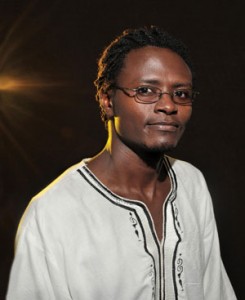LISTEN TO KUSHABA MOSES MWOREKO
Audio clip: Adobe Flash Player (version 9 or above) is required to play this audio clip. Download the latest version here. You also need to have JavaScript enabled in your browser.
Kushaba “Moses” Mworeko is an activist from Uganda who wants to help the people of his country avoid the scourge of HIV/AIDS. In a country and continent that have been ravaged by this disease, Mworeko’s work is invaluable. Yet Mworeko cannot safely return home because in the eyes of his government he is a criminal. His “crime”? Being gay. And Mworeko may have committed a second “crime”: he is outspoken. Mworeko first concealed his identity when speaking out, but now he is revealing his true identity.
In October of 2009, Mworeko presented a paper at an HIV/AIDS conference in Texas and did not return home. Presently, Mworeko is seeking asylum here in the U.S. If he is denied asylum, Mworeko is afraid of what may happen. Regarding the possibility of being forced to return to Uganda, Mworeko said, “It would be a bad story to tell. Definitely, I will have to go to jail.”
While the Ugandan government has been progressive in dealing with the HIV/AIDS epidemic, on gay rights the country has recently moved very far in the other direction. In 2009, the Ugandan Parliament considered legislation that would strengthen the anti-homosexuality laws already on the books, even going so far as to call for the death penalty in some instances.
Mworeko described the possible effects of this legislation, should it be enacted: “[S]ome of the articles [of the legislation] were saying that if you are my friend or you are my father and you happen to know me as a gay person and you don’t report me, then you also have a case to answer. You either go to jail or you pay a fine. Or if you’re HIV positive and you [are known] to be gay, then you are killed. So, it was such a terrible thing that has come to the country. And, well, at times I blame it onto the U.S. evangelicals that went to Uganda and debated about this with the Parliament and then, you know, after that conference they came up with the bill.”
Mworeko described what it is like to be gay in Uganda: “the moment they know you are gay you are expelled from school and that means your parents will not even pay your fees, so what happens [is that] you have to be like a street kid… If you are working and your organization gets to know that you are gay, you are fired and you can’t have, I mean, another job because wherever you go they will still ask you why you were fired from your past job and so you go without a job… If, for whatever reasons, you are known to be gay and you happen to go for medical services, no one is going to attempt you. And you can’t go to church, you can’t have friends, you can’t have family.”
Despite great personal risk, Mworeko has chosen to speak out. He said, “I have decided to be a voice to the voiceless. There are many people in Uganda who are suffering because of who they are… and they can’t express themselves. So why can’t I do this now that I have the opportunity to do it?” “At one point in time, I know that [the] U.S. was like [Uganda today], like 50 or 40 years ago. People weren’t free. People weren’t able to speak out,” Mworeko said. He concluded with a message of hope, “[A]t one point in time, it might not be tomorrow, people will be free… That’s the message that I can leave: that the struggle still continues and so people need to keep on fighting.”

